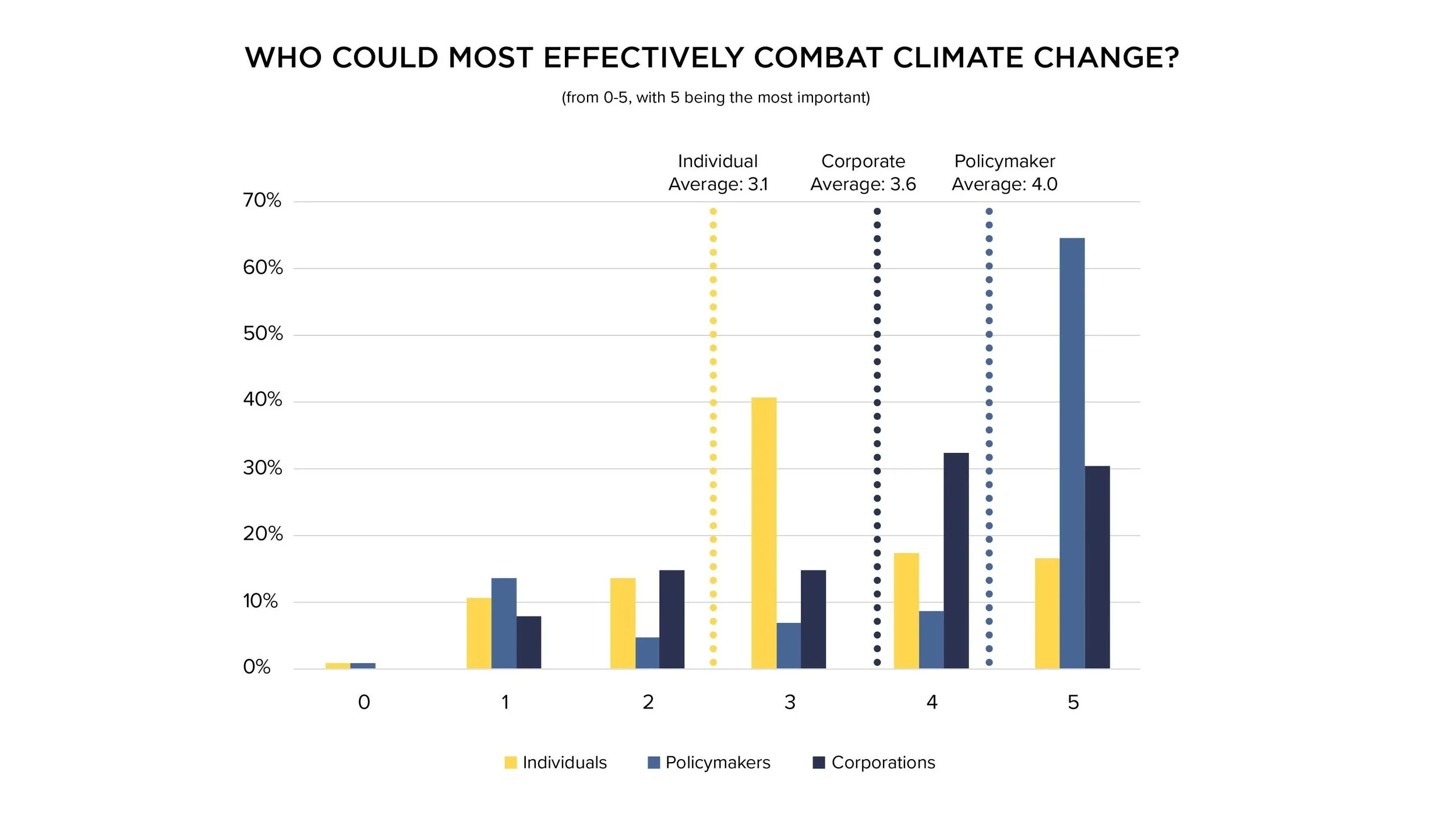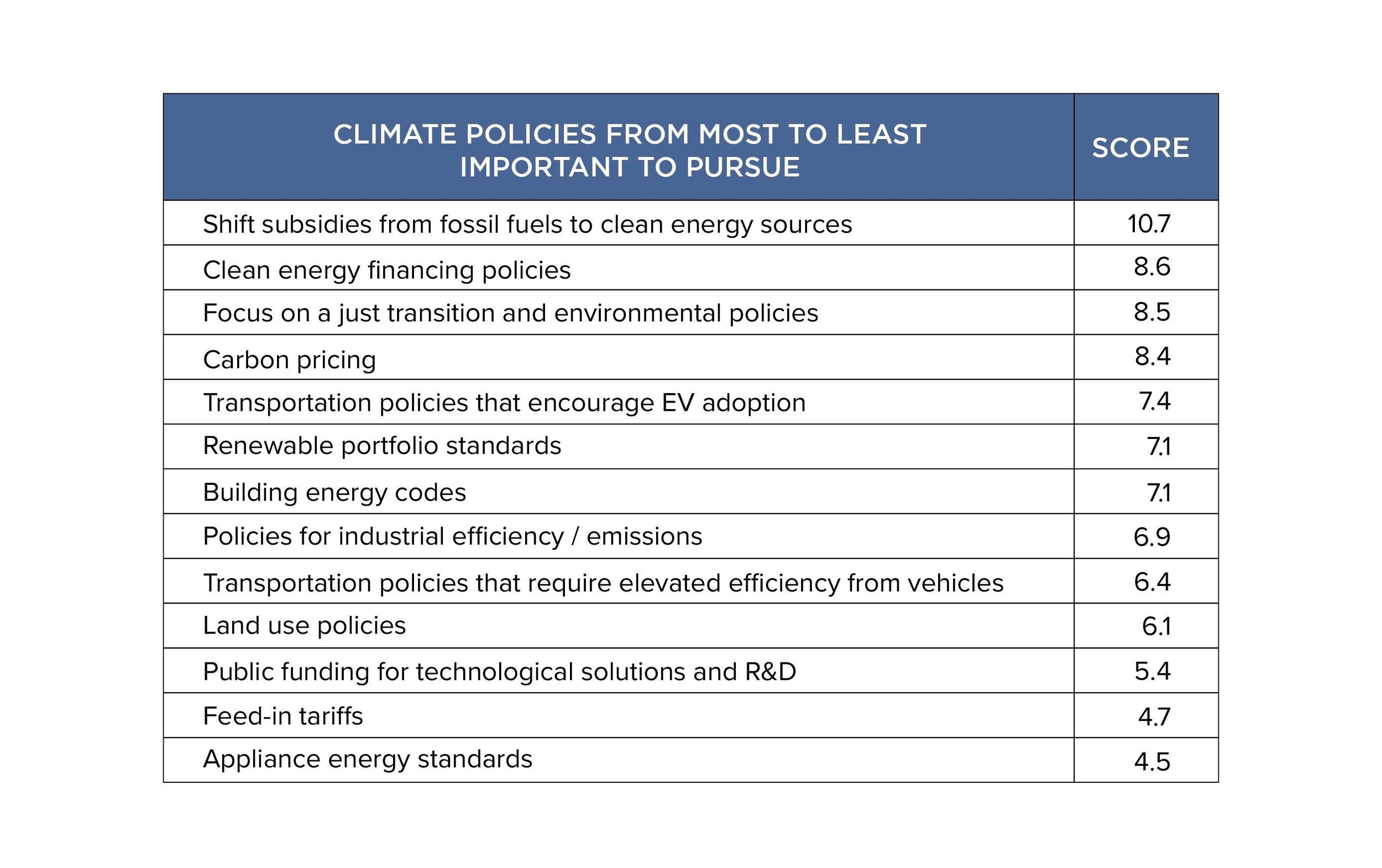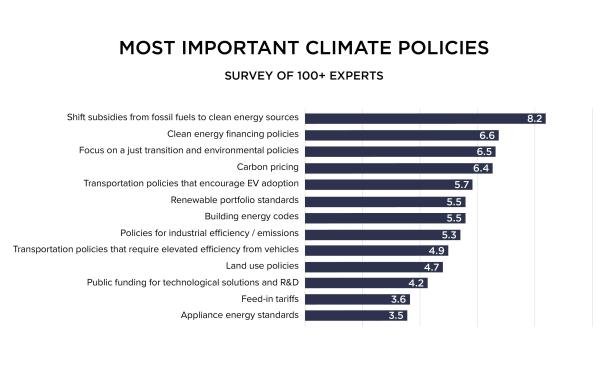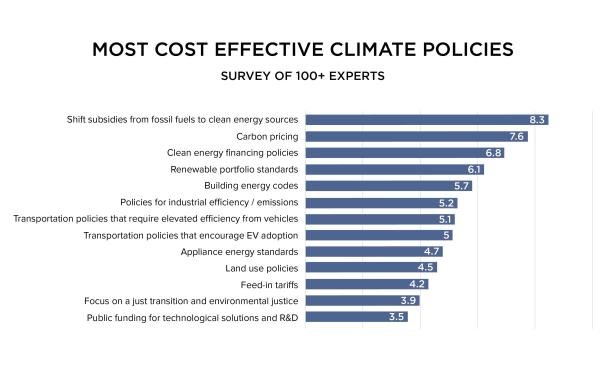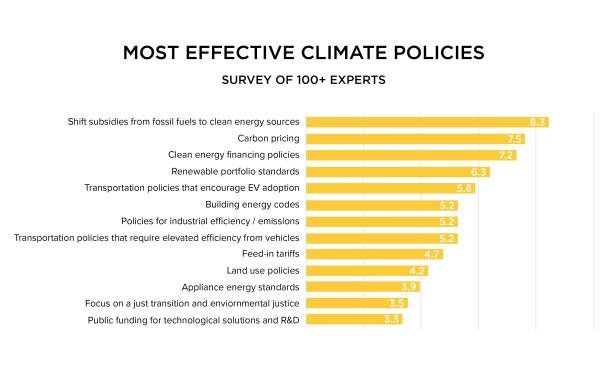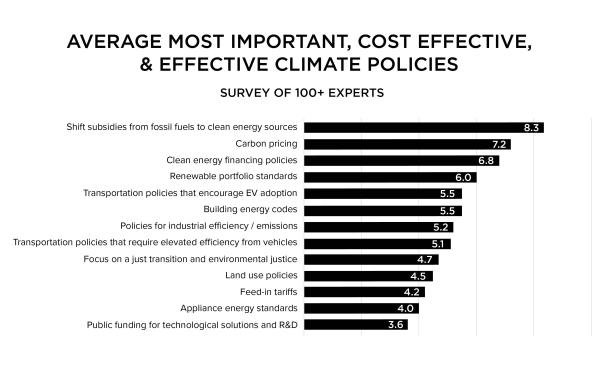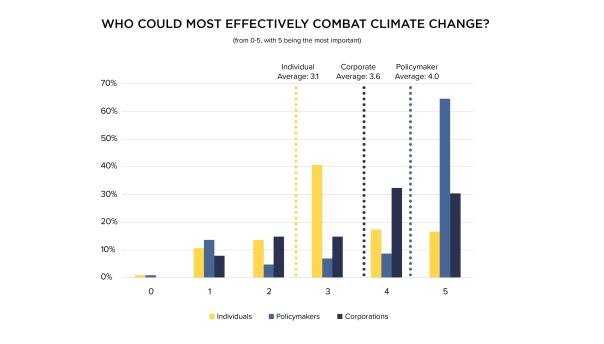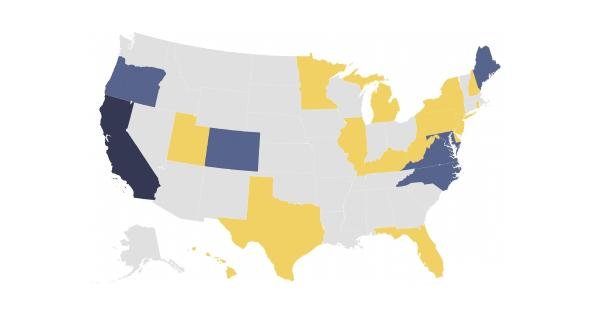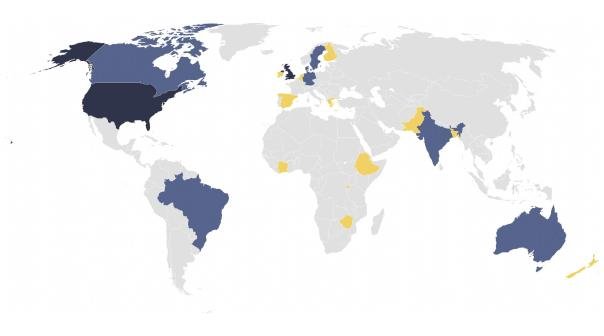2021 Climate Policy & Industry Priorities: Survey of Industry, Academic, and Political Leaders
Policy Priorities
We surveyed over 100 climate experts across the fields of industry, research, and policy. Overwhelmingly, policy action was deemed the most important action we can take to combat climate change. Following that, the second most important plan of attack was determined to be encouraging corporate action. Individual action was deemed to be the least important priority.
Of possible policy options, shifting subsidies from fossil fuels to clean energy sources was deemed to be the most important policy mechanism we can use to combat climate change.
Methodology & In-Depth Findings
Over the past year, Solar Tribune has invested extensive time and resources interviewing experts across every sector and field that touches upon climate change and the need for action: advocacy groups, scientists and academics, politicians and government leaders, writers, influencers, and more. In connecting with these over 100 experts, our goal has been to ask them for input on the type of action that we need to be seeing, both on a collective and an individual level, to fight climate change.
A key resource built out thanks to these invaluable conversations has been a compendium of proposals, supporting quotes, and links and documents where Solar Tribune readers can find out more information when they want to dig deeper. You can wade through the bevy of policy priorities, individual recommendations, and other outcomes from this project at the following links:
This extensive interviewing process is still an ongoing and ever-evolving effort, meaning we’re continuing to build out the above resources (so, please continue to check in on them and see these ‘virtual conversations’ grow!). But in answering those questions, the experts with whom we were connecting started sharing insights into some additional questions outside of the original prompts. Where we were asking for policy proposals that were important, these thought leaders were debating which were the most effective compared with which got the most bang for the buck (whether literal dollars and cents or in terms of political capital). They also highlighted actions that maybe weren’t as directly impactful on a CO2 level but were still intangibly vital. And a common theme of questions that kept coming up: how much should we really be discussing the importance of individual action compared with demanding accountability from politicians? Similarly, how much should we care about our household carbon footprints when the real impact is no doubt coming from the corporate carbon footprint?
Recognizing that these questions were just as critical, if not more so, than the original ones we had been asking, as well as reflecting on the fact that we had inherently built an extensive Rolodex of climate experts (both those who participated with shareable quotes and those we’ve connected with on other levels behind the scenes), we realized it was important to take the next step. We want our contribution to the climate conversation to not just be listing out possible routes to take, but using these expert voices to quantitatively evaluate priorities.
With that, we rolled out our Solar Tribune Climate Expert Survey. Thanks to our over 100 participants who were generous enough to share their time and insights with us via private survey, we’re happy to now be publishing version 1.0 of those results. This iteration is just version 1.0, not a final product, because we do recognize some limitations inherent in our results thus far, and we want to engage with more experts, people with more diverse backgrounds and perspectives, and build a consortium of climate experts who can help us minimize those limitations while maximizing the applicability of our results.
The goal is to really gauge where the climate action winds are blowing, where they may be blowing in coming years, and (most importantly) where they should be going. So, let’s dive in.
Questions Asked
To start with, we collected 13 of the top climate policy priorities that came from our one-on-one expert interviews. These 13 items represent themes, policy mechanisms, and actions that authoritative thought leaders have advocated for in our discussions, and (in no particular order) they are:
Carbon pricing
Shifting subsidies from fossil fuels to clean energy sources
Clean energy financing policies
Renewable portfolio standards
Feed-in tariffs
Transportation policies that encourage EV adoption
Transportation policies that require elevated efficiency from vehicles
Building energy codes
Appliance energy standards
Policies for industrial efficiency / emissions
Public funding for technological solutions and R&D
Land use policies
Focus on a just transition and environmental justice
Presenting these 13 policies, we asked each survey responded to rank all of these options against each other in three different categories:
Importance
Cost-effectiveness
Effectiveness in reducing CO2
Another topic that came up frequently in expert interviews was the debate about how much emphasis should be placed on different potential groups and influencers for climate action. Some activists express anger and frustration about the trend of focusing on how individuals can reduce their carbon emissions because it is theoretically letting the most polluting entities—corporations—off the hook. Along that same train of thought, many argue that it simply should not matter what any particular individual or corporation can do because, in the end, they’re always going to act in their self-interest. As such, this argument goes, regulators and policymakers must be the ones instilling certain requirements towards sustainability, or at the very least putting a thumb on the scale to make sure the dangerous externalities of climate change are priced into the decisions made by people and companies. To address these points, we asked our respondents to rank on a scale of 0-5 how important it was to:
Encourage individual citizens to take action on climate
Encourage policymakers to take action on climate
Encourage individual corporations to take action on climate
And, lastly, to ensure we knew who we were talking to, we asked from demographic information from any respondents who were comfortable sharing the following:
Their political affiliation
Their state or country
Their gender
The industry/sector in which they work
Whether they consider themselves a climate activist
Initial Results
The results from this Version 1.0 of the survey are thought-provoking, and they can best be expressed through graphical representation:
Limitations of the Survey
Before diving into the implications from these results and the conclusions we can begin to make, we must walk through some of the previously suggested limitations. These limitations are important to analyze because they should give us some pause in declaring the results authoritative quite yet.
The biggest limitation established was in who we were able to get to complete the survey. Though we spent extensive effort in reaching a broad set of leaders—people of different political persuasions, lines of work, and more—the people who did end up participating are still a self-selecting group. As such, for full transparency, we do want to present a breakdown of who these 120 people are whose answers comprise version 1.0:
Note: Dark blue has most respondents, lighter blue is moderate respondents, yellow is very few submissions.
Obviously, we’d love to fill this out more completely and fully representatively. We want respondents in equal amounts from both sides of the aisle; we want as many women as men to participate, we want to target influencers and stakeholders who don’t purely consider themselves as climate advocates but are actually just operating in their industry while considering the realities of carbon emissions. If you fit the bill of any of these groups currently underrepresented in our survey, or you know anyone who would fit the bill and is indeed a thought leader, please let us know!
Outside of those who participated, the structure of our survey also has inherent shortcomings that should be acknowledged. Our list of climate policy proposals is, of course, incomplete, and it’s also ignoring that the ideal direction is a suite of complementary policies rather than just one ‘best’ option. No single proposal will be a silver bullet, but by tapping into all of the best tools available that’s how you can build great success. That theme came up time and again in our interviews, and we’ve acknowledged the need for this discussion of ‘System Changes, No Silver Bullet’ on this page, but by artificially requiring respondents to pick one policy over another some of that nuance can certainly be lost.
Another limitation came from the fact that we lumped together policies that stretch expanded beyond single sectors: transportation to power generation to the built environment to land use and more. Each of these sectors has specific goals and unique considerations, so pitting them head to head is a bit of an apples and oranges comparison, in theory. That said, we’re approaching this as a theoretical government leader or political candidate must approach it in practice. When these leaders commit to climate action, various sectors are all essential to address, though some may be more urgent, have lower-hanging fruit, or require different levels of political capital. In that way, pitting these policies against each other is often what leaders must do.
But those limitations should not mean the results of this survey are moot. In fact, in conducting this survey we accomplished an important feat in getting responses from curated experts, not the general public or not decision-makers who aren’t as well-versed in the climate reality as they are in general politics. The people who have provided answers in this version 1.0 are the people who live, work, and breathe these important topics. So, let’s see what insights we can glean from the previously listed results.
Implications of the Results
Recognizing that we have to hedge how much we read into these results given the above limitations, we can still start to recognize some important and valuable trends. First and foremost, the relative ranking of policy options prove to be telling. Shifting subsidies from fossil fuels to clean energy was definitely the most recommended by our experts, as it was rated as the most important, the most effective, and the most cost effective policy across the board.
Trailing behind, carbon pricing and clean energy financing were both in the top 3 of each of these categories as well, showing that these are also critical to any sort of massive package of policies to push forth.
On the other side of the equation, the bottom 5 of each of the categories included public funding of R&D, appliance energy standards, feed-in tariffs, and land use policies. Note that these low relative rankings doesn’t necessarily mean these policy options aren’t worthwhile. In fact, our one-on-one interviews with experts have provided us with key insider quotes endorsing them specifically (see these quotes endorsing R&D, appliance energy standards, feed-in tariffs, and land use). That said, the inherent ‘game’ of this survey was prioritizing and figuring out which policies were atop the priority list and which were less imperative and/or time sensitive. Given that reality, if there was compromise needed to get a wide-scale package implemented, for example, perhaps these types of policies would need to be at the top of the chopping block
While these notes are the most obvious standout points from the survey results, one of the most compelling discussion points come where there’s disparity between the questions. Environmental justice, in particular, ranked as the fourth most important policy consideration but in the bottom three in terms of effectiveness and cost-effectiveness. That result demonstrates that building in the social equity factor will surely add costs to a policy package without as much direct impact to CO2 results, but our experts still ranked it highly for all the obvious reasons why it’s the right thing to do.
Another important conclusion comes in the ranking of individual vs. corporate vs. policy focus. Our expert respondents overwhelming found that policymakers are the ones that should be held most accountable, followed by corporations, and with individuals coming in last. This relative ranking tracks with the scale of potential impact (i.e., government action can have impact many individual corporations, and the typical corporate impact encompasses the carbon footprint equivalent of hundreds to thousands to even millions of individuals). Similarly, these results fall in line with the role each actor plays: a government’s job is to protect its people and ensure they prosper, while a corporation’s sole goal in a capitalist environment is to maximize shareholder return, and an individual is most likely to work altruistically after their basic needs are met—but again the impact of what individuals can do is limited without them trying to tap into that corporate or government level (in fact, that’s the individual action many of our experts recommended—trying to influence change at your workplace or with your wallet as a vote in the economy, or by mobilizing voters and putting pressure on elected officials).
Refining and Building Out Moving Forward
As stated, these results simply represent version 1.0. The Solar Tribune goal is to multiply the number of respondents to our survey and make them more representative and then check back in with a version 2.0.
If you would like to participate, please get in touch with us at matt@solartribune.com. If you specifically have recommendations about experts who should get involved that are women, Republicans, or not climate advocates, per se, then we’d love for you to make those connections for us as well!
And even if you aren’t in those groups who are less represented in our results, we still want more volume of respondents so we have the granularity in version 2.0 we can break out the results even further:
What policies are favored for Republicans vs. Democrats?
How does the sector in which you work in influence who you think should be pushed most between individuals, corporations, and government officials?
Do men and women differ in the priority they place on different sectors of action?
These are the nuanced and important questions we’re eager to answer—but we need your help to do so!


